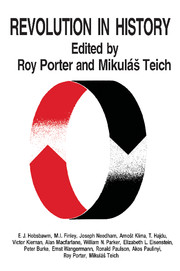Book contents
- Frontmatter
- Contents
- Notes on contributors
- Introduction
- 1 Revolution
- 2 Revolution in antiquity
- 3 Social devolution and revolution: Ta Thung and Thai Phing
- 4 The bourgeois revolution of 1848–9 in Central Europe
- 5 Socialist revolution in Central Europe, 1917–21
- 6 Imperialism and revolution
- 7 Socio-economic revolution in England and the origin of the modern world
- 8 Agrarian and industrial revolutions
- 9 On revolution and the printed word
- 10 Revolution in popular culture
- 11 Revolution in music – music in revolution
- 12 Revolution and the visual arts
- 13 Revolution and technology
- 14 The scientific revolution: a spoke in the wheel?
- 15 The scientific-technical revolution: an historical event in the twentieth century
- Index
1 - Revolution
Published online by Cambridge University Press: 05 February 2015
- Frontmatter
- Contents
- Notes on contributors
- Introduction
- 1 Revolution
- 2 Revolution in antiquity
- 3 Social devolution and revolution: Ta Thung and Thai Phing
- 4 The bourgeois revolution of 1848–9 in Central Europe
- 5 Socialist revolution in Central Europe, 1917–21
- 6 Imperialism and revolution
- 7 Socio-economic revolution in England and the origin of the modern world
- 8 Agrarian and industrial revolutions
- 9 On revolution and the printed word
- 10 Revolution in popular culture
- 11 Revolution in music – music in revolution
- 12 Revolution and the visual arts
- 13 Revolution and technology
- 14 The scientific revolution: a spoke in the wheel?
- 15 The scientific-technical revolution: an historical event in the twentieth century
- Index
Summary
I
To judge by the subject catalogue of the Library of Congress, the literature on ‘revolution’, stable in the 1950S, grew at an extraordinary rate between 1960 and the mid-1970S. Surveying ‘a lively and disorderly’ field, Zagorin (1973, pp. 28–9) observes that there are three possible ways of attacking the problem of revolution. Practically all we know about them comes by the investigation of particular revolutions. Those who practise comparative study, or seek to establish a general explanatory theory of revolution, have been almost entirely parasitic on the first group of students. No attempt can be made here to survey the enormous bulk of their productions, but three observations can be made about the relation of the historiography of actual revolutions to comparative and general study.
First, the revolutions about which we possess abundant and serious literature are those recognized by contemporaries as prodigious and influential upheavals. They are the ‘great revolutions’, e.g. the French, Russian and Chinese (cf. Skocpol 1976, 1979a, 1979b) and those classified as such by analogy with them at the time retrospectively and prospectively. Thus we know more about anti-Bourbon insurrections in nineteenth-century Italy than about Carlist wars in Spain, though the latter were considerably larger than the former. Second, since the ‘great revolutions’ have de facto provided the criteria for the rest, their influence on historiography has been profound. It has operated prospectively on revolutionaries, counter-revolutionaries and social scientists, and retrospectively on both practitioners and historians of revolution. In short, they have provided analytical models. From 1799 onwards revolutions have been searched for analogies to jacobinism, Thermidor and Bonaparte (Brinton 1938; Bahne 1967, pp. 74–6; Cordova 1975, p. 92), and since 1917 for seizures of power as in Russia, for disciplined parties of the Bolshevik type, for Stalinist tendencies. The Chinese and some colonial revolutions drew attention to peasants and protracted guerrilla approaches to power, which had played little part in the analyses before the Second World War.
- Type
- Chapter
- Information
- Revolution in History , pp. 5 - 46Publisher: Cambridge University PressPrint publication year: 1986
- 26
- Cited by



